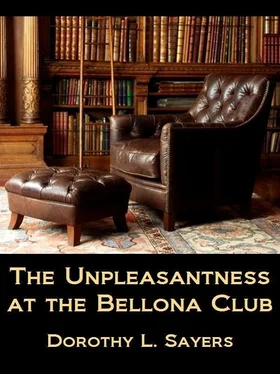“Ah!” said Mr. Pritchard. “I may say that I have been expecting this. A similar suggestion was made to me earlier by Mr. Murbles, and I then told him that my client preferred not to entertain the idea; you will permit me to add, Lord Peter, that the reiteration of this proposal by you, after your employment to investigate the facts of the case in the interests of the other party, has a highly suggestive appearance. You will excuse me, perhaps, if I warn you further that your whole course of conduct in this matter seems to me open to a very undesirable construction.”
Wimsey flushed.
“You will perhaps permit me, Mr. Pritchard, to inform you that I am not ‘employed’ by anybody. I have been requested by Mr. Murbles to ascertain the facts. They are rather difficult to ascertain, but I have learned one very important thing from you this afternoon. I am obliged to you for your assistance. Good morning.”
The beady-eyed clerk opened the door with immense politeness.
“Good morning,” said Mr. Pritchard.
“Employed, indeed,” muttered his lordship, wrathfully. “Undesirable construction. I’ll construct him. That old brute knows something, and if he knows something, that shows there’s something to be known. Perhaps he knows Oliver; shouldn’t wonder. Wish I’d thought to spring the name on him and see what he said. Too late now. Never mind, we’ll get Oliver. Bunter didn’t have any luck with those ’phone calls, apparently. I think I’d better get hold of Charles.”
He turned into the nearest telephone-booth and gave the number of Scotland Yard. Presently an official voice replied, of which Wimsey inquired whether Detective-Inspector Parker was available.
A series of clicks proclaimed that he was being put through to Mr. Parker, who presently said: “Hallo!”
“Hallo, Charles. This is Peter Wimsey. Look here, I want you to do something for me. It isn’t a criminal job, but it’s important. A man calling himself Oliver rang up a number in Mayfair at a little after nine on the night of November 10th. Do you think you could get that call traced for me?”
“Probably. What was the number?”
Wimsey gave it.
“Right you are, old chap. I’ll have it looked up and let you know. How goes it? Anything doing?”
“Yes — rather a cosy little problem — nothing for you people — as far as I know, that is. Come round one evening and I’ll tell you about it, unofficially.”
“Thanks very much. Not for a day or two, though. We’re run off our feet with this crate business.”
“Oh, I know — the gentleman who was sent from Sheffield to Euston in a crate disguised as York hams. Splendid. Work hard and you will be happy. No, thanks, my child, I don’t want another twopenn’orth — I’m spending the money on sweets. Cheerio, Charles!”
The rest of the day Wimsey was obliged to pass in idleness, so far as the Bellona Club affair was concerned. On the following morning he was rung up by Parker.
“I say — that ’phone-call you asked me to trace.”
“Yes?”
“It was put through at 9.13 p.m. from a public call-box at Charing Cross Underground Station.”
“Oh, hell! — the operator didn’t happen to notice the bloke, I suppose?”
“There isn’t an operator. It’s one of those automatic boxes.”
“Oh! — may the fellow who invented them fry in oil. Thanks frightfully, all the same. It gives us a line on the direction, anyhow.”
“Sorry I couldn’t do better for you. Cheerio!”
“Oh, cheer-damnably-ho!” retorted Wimsey, crossly, slamming the receiver down. “What is it, Bunter?”
“A district messenger, with a note, my lord.”
“Ah, — from Mr. Murbles. Good. This may be something. Yes. Tell the boy to wait, there’s an answer.” He scribbled quickly. “Mr. Murbles has got an answer to that cabman advertisement, Bunter. There are two men turning up at six o’clock, and I’m arranging to go down and interview them.”
“Very good, my lord.”
“Let’s hope that means we get a move on. Get me my hat and coat — I’m running round to Dover Street for a moment.”
Robert Fentiman was there when Wimsey called, and welcomed him heartily.
“Any progress?”
“Possibly a little this evening. I’ve got a line on those cabmen. I just came round to ask if you could let me have a specimen of old Fentiman’s fist.”
“Certainly. Pick what you like. He hasn’t left much about. Not exactly the pen of a ready writer. There are a few interesting notes of his early campaigns, but they’re rather antiques by this time.”
“I’d rather have something quite recent.”
“There’s a bundle of cancelled cheques here, if that would do.”
“It would do particularly well — I want something with figures in it if possible. Many thanks. I’ll take these.”
“How on earth is his handwriting going to tell you when he pegged out?”
“That’s my secret, dash it all! Have you been down to Gatti’s?”
“Yes. They seem to know Oliver fairly well by sight, but that’s all. He lunched there fairly often, say once a week or so, but they don’t remember seeing him since the eleventh. Perhaps he’s keeping under cover. However, I’ll haunt the place a bit and see if he turns up.”
“I wish you would. His call came from a public box, so that line of inquiry peters out.”
“Oh, bad luck!”
“You’ve found no mention of him in any of the General’s papers?”
“Not a thing, and I’ve gone through every bit and scrap of writing in the place. By the way, have you seen George lately?”
“Night before last. Why?”
“He seems to me to be in rather a queer state. I went round last night and he complained of being spied on or something.”
“Spied on?”
“Followed about. Watched. Like the blighters in the ’tec stories. Afraid all this business is getting on his nerves. I hope he doesn’t go off his rocker or anything. It’s bad enough for Sheila as it is. Decent little woman.”
“Thoroughly decent,” agreed Wimsey, and very fond of him.”
“Yes. Works like billy-oh to keep the home together and all that. Tell you the truth, I don’t know how she puts up with George. Of course, married couples are always sparring and so on, but he ought to behave before other people. Dashed bad form, being rude to your wife in public. I’d like to give him a piece of my mind.”
“He’s in a beastly galling position,” said Wimsey. “She’s his wife and she’s got to keep him, and I know he feels it very much.”
“Do you think so? Seems to me he takes it rather as a matter of course. And whenever the poor little woman reminds him of it, he thinks she’s rubbing it in.”
“Naturally, he hates being reminded of it. And I’ve heard Mrs. Fentiman say one or two sharp things to him.”
“I daresay. Trouble with George is, he can’t control himself. He never could. A fellow ought to pull himself together and show a bit of gratitude. He seems to think that because Sheila has to work like a man she doesn’t want the courtesy and — you know, tenderness and so on — that a woman ought to get.”
“It always gives me the pip,” said Wimsey, “to see how rude people are when they’re married. I suppose it’s inevitable. Women are funny. They don’t seem to care half so much about a man’s being honest and faithful — and I’m sure your brother’s all that — as for their opening doors and saying thank-you. I’ve noticed it lots of times.”
“A man ought to be just as courteous after marriage as he was before,” declared Robert Fentiman, virtuously.
“So he ought, but he never is. Possibly there’s some reason we don’t know about,” said Wimsey. “I’ve asked people, you know — my usual inquisitiveness — and they generally just grunt and say that their wives are sensible and take their affection for granted. But I don’t believe women ever get sensible, not even through prolonged association with their husbands.”
Читать дальше












